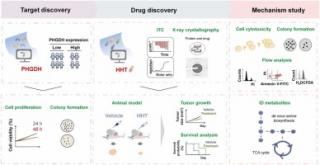Oct, 2023

Neuroblastoma, a childhood cancer affecting the sympathetic nervous system, continues to challenge the development of potent treatments due to the limited availability of druggable targets for this aggressive illness. Recent investigations have uncovered that phosphoglycerate dehydrogenase (PHGDH), an essential enzyme for de novo serine synthesis, serves as a non-oncogene dependency in high-risk neuroblastoma. In this study, we show that homoharringtonine (HHT) acts as a PHGDH inhibitor, inducing intricate alterations in cellular metabolism, and thus providing an efficient treatment for neuroblastoma. We have experimentally verified the reliance of neuroblastoma on PHGDH and employed molecular docking, thermodynamic evaluations, and X-ray crystallography techniques to determine the bond interactions between HHT and PHGDH. Administering HHT to treat neuroblastoma resulted in effective cell elimination in vitro and tumor reduction in vivo. Metabolite and functional assessments additionally disclosed that HHT treatment suppressed de novo serine synthesis, initiating intricate metabolic reconfiguration and oxidative stress in neuroblastoma. Collectively, these discoveries highlight the potential of targeting PHGDH using HHT as a potent approach for managing high-risk neuroblastoma.